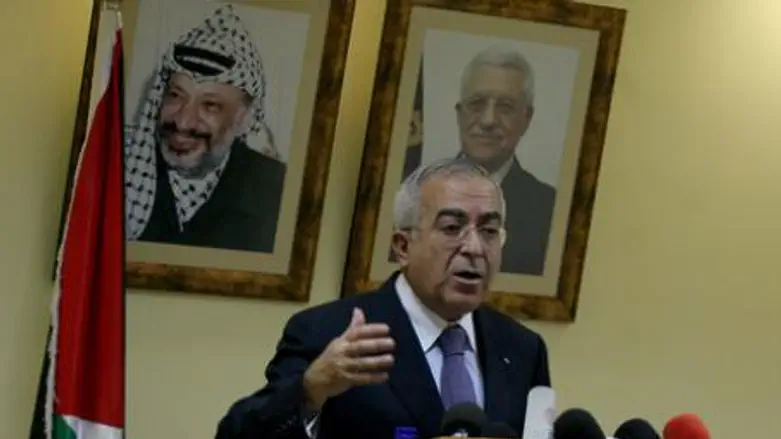
Palestinian Authority Prime Minister Salam Fayyad has charged that “the cause of the Palestinians” has never been more marginalized than it is today.
Fayyad, who spoke to the British daily The Independent, cited the international focus on the Arab spring, the eurozone crisis and the U.S. electoral cycle as reasons for the fact that PA leaders were facing a “path of growing untenability.”
He was strongly critical of the West’s failure to tackle Israel more “seriously” over what he termed its “violations of international law.” Fayyad declared that this “marginalization” was now the “biggest obstacle” to progress towards a Palestinian state.
“Our cause has never been this marginalized,” he told The Independent. “Ever. This is our greatest challenge.”
He warned that the Palestinian Authority itself was being undermined because of factors ranging from its acute financial crisis to a potential loss of faith by PA Arabs that it would able to end to “an occupation” that is “entrenching itself by the day.”
“The Israeli Ministry of Defense is trying essentially to take out of existence eight hamlets in southern Hevron under a pretext that you think would be viewed as completely outrageous,” he accused. “The army is running out of space for military training and so you displace an entire population… Telling you that these people have homes in Yatta. That is incredibly outrageous. It’s not that we accept any demolitions whatever but here we are talking about the total elimination of communities.”
Fayyad said the international Middle East Quartet of the U.S., EU, Russia and the UN, had focused on what at present was the “seemingly impossible task of re-launching the peace process in an effective manner… at the expense of paying attention” to a series of violations which included, but were not limited to, expansion of settlements in Judea and Samaria and which had taken place with “no consequences whatever.”
He charged Israel of conducting nightly incursions into cities designated under the Oslo Accords as Area A which is under control of the Western trained PA security forces.
“There is not a night when there are not multiple raids or incursions in Area A,” Fayyad said, adding that Prime Minister Binyamin Netanyahu had been in the cabinet that had accepted the internationally agreed Road Map which, among other things, had called for a halt to Jewish building in Judea and Samaria.
“It really is outrageous. There is not a single requirement of the road map that the government of Israel can assert they are complying with. Not one,” he said.
Fayyad declared, “What the EU, indeed the whole world should do…. is to ask the government of Israel - any government of Israel a straightforward question: ‘Do you support as a solution to this conflict the emergence of a fully sovereign state of Palestine on the territory occupied in 1967, including East Jerusalem? Yes or no?’”
He added, “If they answer yes it is going to be very hard for them to explain how they continue to accept settlement expansion, settler extremism, violence that in certain instances cannot be described other than as outright terrorism.”
Israel froze construction in Judea, Samaria and Jerusalem for ten months in 2009 at the request of the United States, in an attempt to bring the sides back to the negotiating table.
However, PA Chairman Mahmoud Abbas chose to avoid resuming negotiations and instead chose to continue to impose preconditions for talks. He has demanded that Israel accept the indefensible pre-1967 lines as final borders, release all Arab terrorists from its jails, and halt construction for a second time before talks begin.
He has warned that he may seek non-member status for a Palestinian state at the United Nations if peace talks with Israel do not resume.
Fayyad noted that the most immediate threat is the current financial crisis of the PA, which despite the huge strides made in financial management under his premiership, left it unable to pay employees salaries in full last month.
“When you start every day wondering whether to pay pharmaceutical companies for medical supplies or pay some other supplier, crisis management overrides everything else,” Fayyad told The Independent. He said that the financial crisis, despite being a matter of a “few hundred million dollars”, is a function of a distracted international community - including the region’s Arab neighbors, from whom emergency aid is normally more easily forthcoming.
